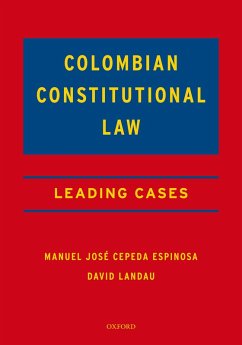This book provides in English the case law of the Colombian Constitutional Court, which has become one of the most creative and important courts of the global south and the world since its creation in 1991. It offers concise and carefully chosen extracts of the Court's most important cases, along with notes and introductory materials to place them in historical and comparative context. The book covers the Court's landmark rights jurisprudence, including the decriminalization of drug possession, the legalization of same-sex marriage, the protection of social rights through broad structural orders such as the ones covering internally displaced persons and the right to health. It also covers the protection of the rights of indigenous peoples to cultural autonomy and to be consulted before economic projects are undertaken on their land, and the rights of victims of the country's long-running internal armed conflict to truth, justice, and reparations. Also provided are the Court's most noteworthy structural cases, particularly its successful attempt to limit the use of states of exception and its substitution of the constitution doctrine, which allows it to strike down amendments that replace rather than amending core principles of the existing constitutional order. The materials focus on the Court's contributions in a comparative perspective, showing how they are exemplary of a range of problems faced by courts around the world and particularly as an example of aggressive judicial review by the courts of the global south. At the same time, they demonstrate how many of the Court's key cases - such as the judicial review of the peace process with guerrilla groups or the striking down of an amendment to allow a popular president to seek a third term - are reactions to the historical features of the Colombian legal and social landscape.
Dieser Download kann aus rechtlichen Gründen nur mit Rechnungsadresse in A, B, BG, CY, CZ, D, DK, EW, E, FIN, F, GR, HR, H, IRL, I, LT, L, LR, M, NL, PL, P, R, S, SLO, SK ausgeliefert werden.


